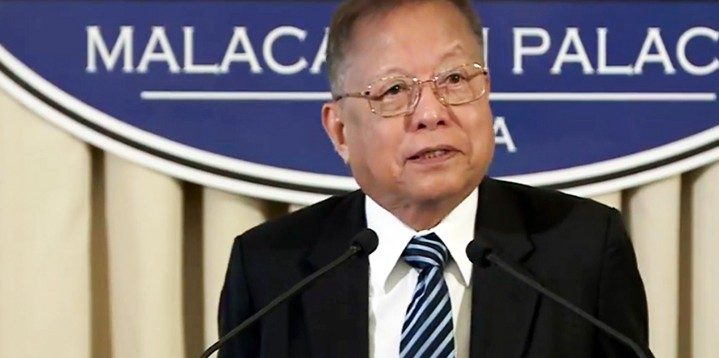News
Covid-19, typhoons ‘sharpen’ need for federalism: Puno

Puno, also chair of the now-defunct Consultative Committee (ConCom) tasked to draft a federal constitution, emphasized that a federal system of government would curb red tape and corruption in the bureaucracy. (PCOO file photo)
MANILA – Retired Chief Justice Reynato Puno has renewed his call for shift to a federal system of government, stressing that the distribution of powers and resources among regions would allow better distribution of assistance in areas severely affected by typhoons and the coronavirus disease 2019 (Covid-19) pandemic.
Puno, also chair of the now-defunct Consultative Committee (ConCom) tasked to draft a federal constitution, emphasized that a federal system of government would curb red tape and corruption in the bureaucracy.
“All these crises brought about by this pandemic, by these typhoons, they all sharpen the need for a federal government,” he said in a webinar organized by the Pimentel Institute for Leadership and Governance on Saturday.
He pointed out that despite the signing of Republic Act 11469 or the Bayanihan to Heal As One Act (Bayanihan 1), many low-income families failed to receive subsidies under the Social Amelioration Program (SAP) on time.
“Nakita natin na kahit na anong gawing response ng national government, masisipag naman yung mga opisyales natin, pero hindi natin magawa. ‘Yun lang distribution ng tulong doon sa mahihirap under yung Bayanihan law hindi nagawa ‘yun (We saw that no amount of response carried out by the national government, even if our officials are hardworking, they can’t do it. Just the distribution of aid for the poor under the Bayanihan Law, they can’t accomplish),” he said.
Puno, however, clarified there was no specific national or local official to blame in delays in the distribution of cash assistance.
“We’re not blaming a specific person but it’s the unitary government. And then you know, they suffer from a lot of red tapes. Ang daming regulasyon diyan. Pag nag-violate ka ng regulasyon dadalhin ka sa Ombudsman kaya kawawa rin sila (There are too many regulations. If you violate regulations, they’ll take you to the Ombudsman),” he added.
Puno said changing the form of government from the current unitary to a “bayanihan”-type federal will break the over-concentration of power in the national government.
“In order to foster this cooperative type of federalism, you will see that the bayanihan constitution does not allow the imposition of double taxation; it has also an equalization fund which is not less than 3 percent of the annual General Appropriations Act that will be given to poor regions to enable them to achieve financial viability and economic sustainability; it also established an inter-governmental commission whose function among others is to promote friendly and cooperative relationship among the regions,” he said.
Under the draft federal constitution, regions will get their funds from five sources namely regions’ own collection of taxes and fees; a share of top revenue sources; a share from Equalization Fund; an additional funding through the General Appropriations Act; and a share of income from natural resources.
Timeline
Puno, meanwhile, said the timeline of a possible shift to federalism would depend on “the will of the people.”
“The timeline will ultimately depend on what will be the will of the people. At the very least, we should have this issue on the political table this 2022 elections.
Who will be the candidates who will espouse federalism? We’re not saying that they espouse our federal bayanihan system, they can espouse other types of federalism,” he said.
For his part, Ateneo School of Government Dean Ronald Mendoza, agreed that it was necessary not to lose the momentum established for “preparatory reforms” that can be a realization of a stronger federalism in the future.
“I don’t know that people are still envisioning dramatic reforms such as changing the Constitution in the next year in a half. If so, I think it would be such a big gamble. But I do think that the momentum established by those who envisioned a better, stronger system for our democracy, our economy, our political system, I think this is a momentum that we should not lose, this is a coalition that we should keep building, and include, enlarge the circle of those who believe in this reform,” Mendoza said.
While a push for federalism under a pandemic might seem like a big gamble, he said there is still an opportunity to push for key specific areas of reform or turn them campaign issues to continue to discourse.
The now defunct ConCom submitted a copy of the draft “bayanihan” federal constitution to the Duterte on July 9, 2018.
Last August, Malacañang said Duterte has not abandoned his campaign promise to shift to a federal system of government but would prioritize the prevailing Covid-19 pandemic.
The Palace said Duterte is only looking at three options to amend the 1987 Constitution namely Constitutional Convention (Con-Con), Constituent Assembly (Con-Ass), or people’s initiative.





















